The Man With the Plan Behind KBF
Chad Hoover built Kayak Bass Fishing. Its next step is a revolutionary partnership with FLW.
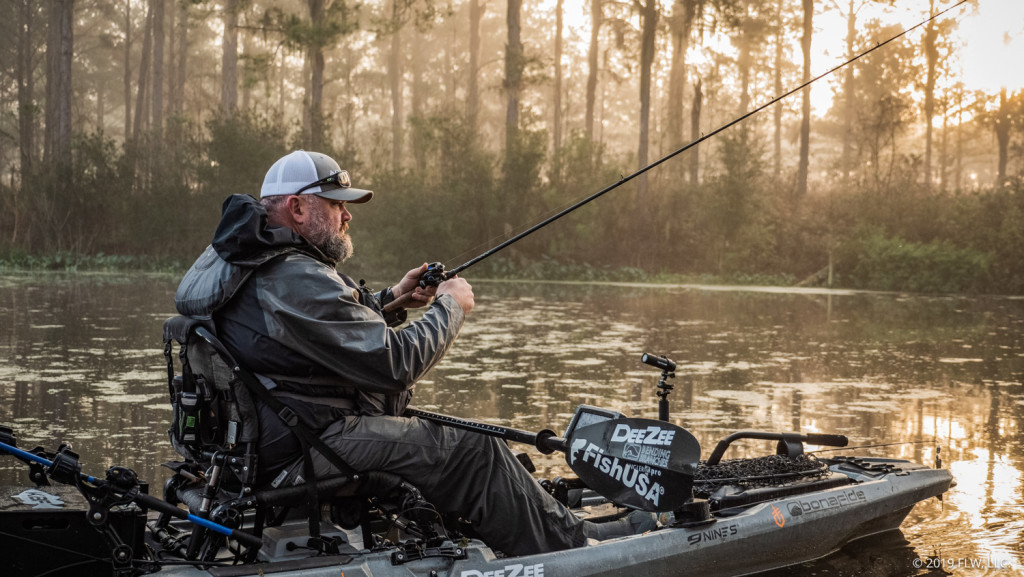
Fishing for bass from a kayak is a relatively new concept when you consider how established the sport of bass fishing really is. But in recent years, kayak fishing – specifically for bass, and, more specifically, in a tournament format – is poised to help expand the sport, and Chad Hoover has been at the forefront of that movement. His is the momentum that has been driving it since nearly the onset.
As Hoover tells it, kayak fishing first gained traction in the saltwater scene, which the 44-year-old retired Navy lieutenant took full advantage of to the tune of a couple angler-of-the-year titles on the regional circuits while he was still an active-duty officer. But Hoover grew up fishing for crappie and catfish and bass in Louisiana and Georgia, and, despite his success in the saltwater tournament scene, the founder and president of Kayak Bass Fishing (KBF) saw an opportunity to get back to his roots.
“The real impetus was I’d gotten into kayak fishing in saltwater, but I was always a freshwater guy,” he explains. “Back then, kayak fishing was really popular in all the saltwater forums. That’s where kayak fishing really started.”
A bass angler at heart, Hoover began to eye what was then the most advanced form of communication and fishing-related social interaction on the internet: forums. And what bothered Hoover most was that every kayak-fishing forum he frequented always favored the saltwater scene, with bass fishing relegated to the bottom of the page.
Oddly enough, it wasn’t due to a lack of participation or demand for bass-specific kayak tournaments.
Hoover saw the demand was there and began organizing what was then a burgeoning idea few had actually tackled at the time: online tournaments. Given the unique nature of kayak bass fishing vis-à-vis catching, photographing and releasing fish during tournaments, it was possible to organize and operate tournaments on the internet alone. And the venture was a success for the sport and Hoover himself, who began working on a book called Kayak Bass Fishing: Largemouth, Smallmouth, Stripers around that same time.
“About that time I was starting to write a book on kayak fishing,” he says. “The web page for the forum was born of me wishing there was a place for kayak bass fishermen to interact. I didn’t really want to [write a book]. I was writing articles. I finally got convinced to write the book.
“I was writing Kayak Bass Fishing, and while writing the book, online tournaments were something I had just started doing. So, by the time I finished the book, I was already running online tournaments for catch, photo, release for largemouth bass. Everybody else was doing it for saltwater, but they also weren’t doing it online.”
With the success of Hoover’s online tournaments (which he admits were more of a success in terms of popularity than profit), the entrepreneur at heart began kicking around the idea of organizing and operating live tournaments. After all, the demand had proved to be there. It was just a matter of choosing a location that was central enough to drive participation numbers.
“I loved fishing on Santee Cooper, and I knew it was the best place within proximity of where I was at for numbers, catching big fish, centrally located on the East Coast where most of the popularity for kayak fishing was at the time,” Hoover says. “I put it on Santee Cooper and put it on my forum page, and the first tournament I only promoted it for two weeks and we had 121 people show up.”
And with that, KBF reached its adolescence.
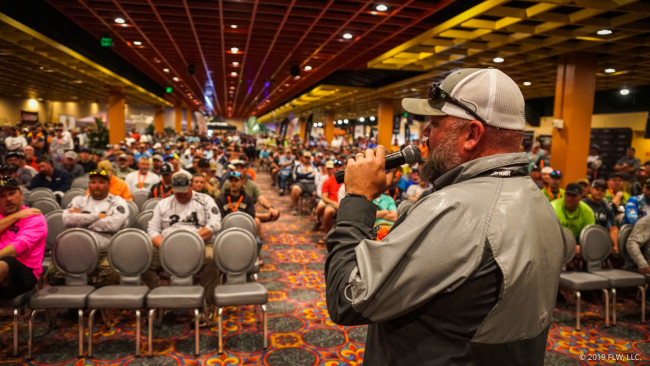
The inception
With the success of that first live event in 2013, Kayak Bass Fishing took off in earnest. For Hoover, turning that snowflake into a snowball was just a matter of savvy business decisions.
“When I did the first tournament, everybody was like, ‘You’ve got to do more.’ To be honest with you, doing more was not in the cards,” he admits. “I was active-duty military at the time. I had pretty much all I could take. I had just gotten a divorce. I was a single father.
“What was really happening was I was figuring out the sponsorship model. I was running a pro-staff for one of the kayak companies. I was learning that game pretty hard. I do product development myself. I did product development in the Navy, so I kind of knew the game, but on a much bigger scale.”
Still, as Hoover was carefully planning his next steps, demand continued to flourish. Freshwater kayak fishing’s popularity was nearing a boom. If Hoover didn’t take advantage of the demand, someone else surely would.
After retiring from the Navy – and amid the success of what has turned into a wildly popular video career that now manifests itself primarily as one of the most comprehensive kayak-fishing channels on YouTube – Hoover decided to heed the calls for more.
“People wanted a tournament that was more centrally located,” he says. “So we went to Kentucky Lake [convention and visitors bureau] and told them what we wanted to do. They got on board, and we had our first KBF Open that wasn’t on Santee Cooper.”
KBF Opens led the way to KBF National Championships, which have become the pinnacle of kayak bass tournament fishing in recent years. When the KBF Championship came to Kentucky Lake in 2018, it was the first time a kayak bass tournament awarded $100,000 to the winning angler.
Hoover never envisioned his tournaments paying out sums on par with traditional bass fishing tournaments at the professional level. Or perhaps he did, though that vision was never tied to a dollar amount.
“My plan was ‘I’m going to build the biggest tournament in the kayak-fishing industry,’” Hoover admits. “I’m going to create the World Series of Poker, where you create the big event first, and it creates its own infrastructure beneath it.”
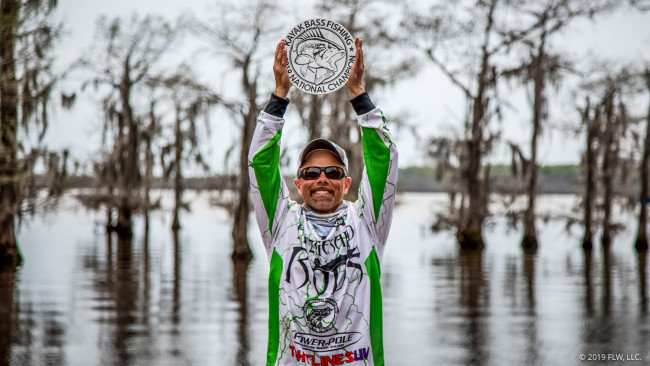
A new breed of professional angler
Kayak bass fishing as a concept has the benefit of filling a massive void. At one end of the spectrum, professional tours dominate the bass fishing world with huge payouts and myriad media coverage. Even high school, college and mid-level tournament circuits capture the attention of the bass fishing public. Seventy-thousand-dollar bass boats aplenty.
At the other end, bank fishermen pound the shoreline in search of whatever fish are within casting distance. There’s a grassroots element to fishing that contrasts starkly with the modern world of big-money tournament fishing, but that’s where most kids first learn to bait a hook and make a cast.
In the middle? Next to nothing, at least until the last decade or so. Hoover has been a big reason why that’s now the case.
Until recently, kayak fishing has been the exception rather than the norm. It’s been called a “niche” or a “novelty” by bass fishing purists. But Hoover sees it entirely differently, comparing the sport to another mainstream sport that certainly wasn’t always mainstream.
“Mixed martial arts, when it started, it wasn’t mixed,” he says of the old-school brawlers who initially dominated the sport. “You’ve got to know all the disciplines now to be successful. Kayak fishing right now is like that for fishing. Everybody underestimates it. Everybody kind of considers it a novelty.”
Always quick with an analogy, Hoover also likens kayak fishing to another sport that tends to have a massive overlap with the fishing public.
“I tell people that hunt deer, ‘Do you bow hunt? Do you go back to rifle season when that kicks in?’ It extends the season,” he explains. “It gives me more opportunities. For every reason a hunter bow hunts, you kayak fish.”
Sticking with the analogy, Hoover goes on to explain the more specific similarities between the two, particularly on the art of stealth.
“Scouting from a kayak if you’re a bass boat angler, you don’t have to run in there and spook them [the fish]. You can paddle in and check spots pre-fishing that you don’t even ever get to see. You get to see fish you’ve never gotten to see before. It’ll change your outlook on fishing.”
Ask Hoover if he thinks elite kayak anglers are any less skilled than traditional tournament professionals and you’ll get an emphatic response.
“The guys that are fishing my tour are not scrubs,” he says. “There are some hammers out there. This is not taking candy from a baby.
“You’ve got to make better decisions. The adjustment that you make is you’ve got to be willing to become a better angler. When you roll back out in a bass boat and you take into account the things you’ve learned from kayak fishing, it’s like you were training with ankle weights on and now you’re running a race.”
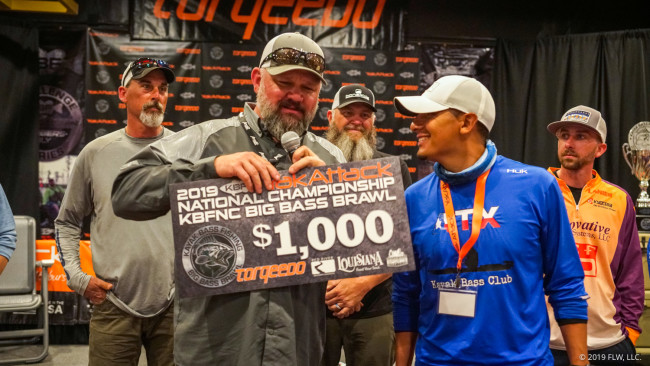
The partnership
KBF’s growth has been astronomical – look no further than the $100,000 first-place payout at last year’s championship. But Hoover is savvy enough to know that growth isn’t always exponential, and that sometimes it just makes sense to form partnerships that can bolster that growth for years to come.
That partnership came in the form of a union with FLW and a pair of events in 2019, both in conjunction with FLW Tour events. The first of those tournaments will take place on Nickajack Lake as the Tour fishes on Chickamauga next week. The second will be the FLW/KBF Cup in Hot Springs, Ark., during the FLW Cup in August.
“It [the relationship] is mutual,” Hoover says of the partnership. “It raises awareness for kayak fishing from the exposure FLW gets to the greater fishing community at large. At the same time, FLW gets a grassroots connection to anglers who are thinking along the lines of becoming a tournament angler through KBF.
“I think the benefit from FLW that KBF receives is that KBF receives exposure on a much larger platform and gets a bit of national and international validation through the relationship, and FLW gets from KBF another avenue to get folks excited about fishing and tournament fishing and the fishing industry as a whole. It’s a natural extension of what FLW does.”
FLW Vice President of Operations Dave Washburn summed up the symbiotic relationship perfectly with his statement in the original press release for the announcement of the partnership.
“Kayak fishing has become incredibly popular in recent years and continues to grow,” Washburn said. “We are excited to work with KBF as the kayak-fishing community leader to elevate the sport to new highs with tournaments offering over 100-percent payouts through the course of the season and the biggest media platform available to kayak anglers.”
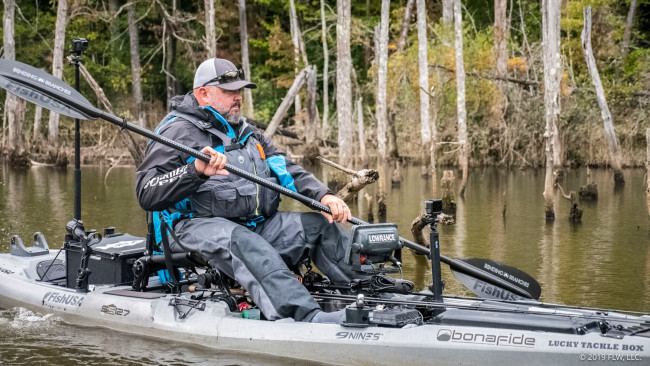
Fail until you don’t
As KBF nears its adulthood, Hoover the businessman is nearing full actualization as an entrepreneur, a designer, an organizer, a president – and nearly every other label he’s earned throughout the course of his career.
But don’t get success confused with lack of failure.
Hoover cites the title of the book Fail Until You Don’t: Fight. Grind. Repeat. by Nashville-area and nationally syndicated radio DJ Bobby Bones as one of his mantras. Fail until you don’t. Keep pushing forward until there’s nothing pushing back.
“In this kayak-fishing thing and the entrepreneurial world, I blew my life savings twice,” Hoover admits. “Jesus, take the wheel. Hope this works out.”
Hoover points to “growing up in the South, poor, living in a trailer park” and the more than $200,000 of his own money he pumped into KBF at a time when he was sleeping in the spare room of a friend’s house as times in his life with stark enough contrast to silhouette his more recent success.
“I’m a guy that wakes up every morning, and I do what I want to do,” he says. “I go where I want to go. I fish; my job is fishing. My life is creating content and promoting the sport that I love. I hit the lottery.”
That last part isn’t entirely accurate, or perhaps accurate at all. Hitting the lottery suggests a random act of improbability and work-free luck. Hoover’s life has been anything but that.
His best and favorite mantra – the one he jokes should be on his headstone someday – best sums up Hoover’s career to date:
“If you ain’t willing to risk everything you got, you’ll never get everything you want.”
Hoover has risked everything he’s had countless times. And while there’s probably still more out there he wants, what he has is more than he’d ever expected to get.